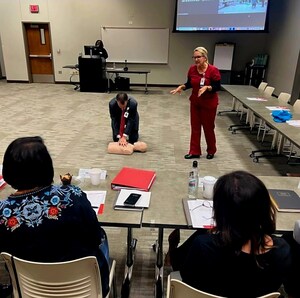DALLAS, July 14 /PRNewswire-USNewswire/ -- After two days of hearings, an advisory committee to the U.S. Food and Drug Administration (FDA) recommended that the FDA allow the type 2 diabetes drug rosiglitazone (brand name, Avandia), to stay on the market, but with most committee members suggesting that the label be revised to include increased warnings. Rosiglitazone is one in a class of drugs called thiazolidinediones (TZDs), used to treat type 2 diabetes.
(Logo: http://www.newscom.com/cgi-bin/prnh/20100222/AHSALOGO)
(Logo: http://photos.prnewswire.com/prnh/20100222/AHSALOGO)
The advisory committee voted 20 to 12 (with one abstention) to keep rosiglitazone on the market and recommended 20 to 10 (with two abstentions) that the TIDE trial continue. This trial, requested by the FDA, is evaluating patients with type 2 diabetes and a history of or risk for cardiovascular disease, and comparing the cardiovascular effects of long-term treatment with rosiglitazone, pioglitazone or placebo when added to standard care. The trial will also compare the effects of long-term supplementation with vitamin D on death and cancer.
The FDA will consider these recommendations and make a final ruling. "The advisory committee's deliberations were difficult, since the available data were limited, controversial, and subject to multiple interpretations by seasoned investigators and reviewers," said Ralph Sacco, M.D., president of the American Heart Association. "We agree with the committee that further research is necessary to answer the remaining questions, and we encourage the FDA to continue to evaluate and assess carefully all new clinical data as they become available."
For patients with diabetes, the most serious consequences are heart disease and stroke, and the risk of suffering from them is significantly increased when diabetes is present.
"It's especially important that patients not change or stop medications without consulting their healthcare provider," said Sacco.
For patients with diabetes, the American Heart Association recommends the following:
- The cornerstone of prevention and treatment should be healthy lifestyle choices, such as not smoking, following a healthy diet and remaining physically active.
- Because of the increased risk of heart disease and stroke, it is very important to achieve optimal control of your blood sugar, blood pressure and lipids (such as cholesterol and triglycerides) with lifestyle and medications when needed. For people with diabetes who are also at increased risk for heart disease, low-dose aspirin therapy is recommended as a reasonable way to prevent a first heart attack or stroke.
- Focus on blood sugar control, keeping your HbA1c level below 7.0, is likely to reduce the risk of the "microvascular" complications of diabetes, such as kidney failure, painful nerve problems and decreased vision or even blindness.
For healthcare providers, the American Heart Association offers the following guidance on glucose-lowering medications:
- Metformin should generally be the first choice, particularly in obese patients. If it does not produce adequate HbA1c control, other medications can be considered, recognizing that knowledge is limited about the effect of other glucose-lowering agents on cardiovascular risk.
- If a TZD (such as pioglitazone or rosiglitazone) is considered for lowering glucose, patients should not expect it to reduce the occurrence of heart attack or stroke. The rationale for choosing a TZD should be discussed with a physician. However, patients who have successfully achieved recommended HbA1c control on a TZD may consider remaining on their medication. If the treating physician and/or the patient are uncomfortable with using a TZD, another medication could be substituted.
Related links:
2010 AHA/ACC issue advisory on diabetes drugs and heart risk
http://www.newsroom.heart.org/index.php?s=43&item=970
2010 Aspirin for Primary Prevention of Cardiovascular Events in People With Diabetes,
A Position Statement of the American Diabetes Association, a Scientific Statement of the American Heart Association, and an Expert Consensus Document of the American College of Cardiology Foundation
http://circ.ahajournals.org/cgi/content/full/121/24/2694
2007 Statement from the American College of Cardiology, American Diabetes Association and American Heart Association Related to NEJM article, "Effect of Rosiglitazone on the Risk of Myocardial Infarction and Death from Cardiovascular Causes" http://americanheart.mediaroom.com/index.php?s=43&item=61
SOURCE American Heart Association
WANT YOUR COMPANY'S NEWS FEATURED ON PRNEWSWIRE.COM?
Newsrooms &
Influencers
Digital Media
Outlets
Journalists
Opted In






Share this article